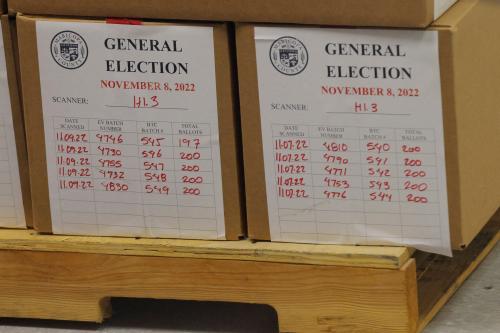As anticipated, the Oct.11, Liberian presidential elections did not produce an outright winner and the runoff election will be held on Nov. 8. As of Monday, Oct. 17, approximately 97 percent of the vote had been counted. Poll results show the incumbent president, Ellen Johnson-Sirleaf, leading with 44 percent of the vote, followed by William Tubman with 32.2 percent. Other candidates with credible showings include Prince Johnson with 12 percent and Jacob Smith with 5.5 percent of the vote. The election turnout was reasonably high with 71 percent of registered voters participating. Based on election monitoring reports by regional and international observers, The Carter Center and Economic Commission of Western African States (ECOWAS), the election is considered to have been largely free and fair. Named one of the shared winners of the Nobel Peace Prize just four days before the election, President Ellen Johnson-Sirleaf will now compete in a second campaign with William Tubman, a grandson to former Liberian president William Tubman Sr.
Many expected that Ellen Sirleaf would have a boosted showing in the elections after winning the Nobel Prize, and many Liberians saw the timing of the announcement as an attempt to tip the election in her favor. It is difficult, however, to determine the actual impact the Nobel Prize had on Liberians’ voting decisions. Nonetheless, it is apparent she faced very stiff competition and the runoff will be equally tight. Tubman has solid support from some regions and, given his political family connections, he is a formidable opponent. President Sirleaf is highly favored internationally, but it seems that she scores much lower in her own country. Opponents accuse her of being lax in the fight against corruption and failing to push for various governance reforms. Additionally, most Liberians have not seen significant improvement in their quality of life since the cessation of conflict in 2003. This state of affairs has created a sense of desperation and frustration with the incumbent amongst the populace, making Sirleaf’s position vulnerable.
While all these issues will be considered during the runoff election, it is the role of the other general election presidential candidates who will most likely determine the winner. In particular, Prince Johnson—who garnered 12 percent of the initial vote—could end up being a kingmaker. Johnson has already announced to media that he is endorsing Sirleaf, arguing that she represents better policies and, if elected, will only serve another six years as president. Sirleaf, however, must carefully weigh whether such support is worth the cost: Johnson, the current Senator of the highly populated state of Nimba, is a former warlord who presided over the torture of Samuel Doe. His human rights credentials are likely to contaminate the reputation of any candidate he endorses. Furthermore, his endorsement may also come with demands. However, at this time, Johnson has acknowledged that his support is not due to any promises by Sirleaf.
The election outcome notwithstanding, post runoff Liberia will remain fairly fragile if the loser does not concede defeat or claims electoral fraud. If this occurs, Liberia will become a more fragmented country, similar to other African countries where democratic elections have been polarizing. Violent incidents seemingly related to the elections are increasing. Recently, Sirleaf’s headquarters in Monrovia were burned in a suspected arson fire, and a radio station owned by the opposition was petrol bombed. Some observers question whether the runoff is further dividing Liberians and ask is this a sign of things to come?
Despite these negative reports, the runoff could also provide an opportunity to consolidate Liberia’s democracy. A coalition government is not recommended at least, based on other experiences in Africa. However, if the winner takes a pragmatic approach and forms an all-inclusive government that ensures no group or region feels marginalized, Liberia could be on its way to becoming a peaceful and stable country. It is up to Sirleaf and Tubman to ensure Liberia does not revert to conflict. The loser must concede and the winner should take a nationalist stand to work with the opposition.



Commentary
Op-edWill the Liberian Election Runoff Result in Fragmentation or Consolidation of Democracy?
October 20, 2011